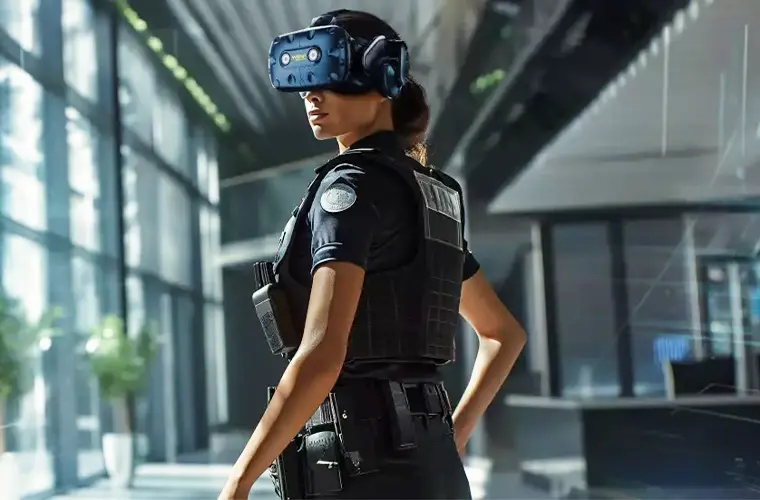In a dimly lit room, a police officer wears a virtual reality (VR) headset. Within moments, they’re not just watching a scenario unfold—they’re living it.
In the simulation, a man in distress clutches his head, pacing erratically as he yells incoherently. The officer must decide whether to escalate the encounter into chaos or de-escalate it into calm.
As mental health crises become increasingly common during police interactions, innovative solutions are urgently needed to address the gaps in training. This type of cutting-edge VR training, now being embraced by law enforcement agencies, could redefine how police respond to individuals in mental health crises.
A new study published in Criminal Behaviour and Mental Health reveals how virtual reality (VR) training can better prepare officers for encounters with individuals experiencing psychiatric distress.
The study, led by researchers from Florida Atlantic University, highlights the technology’s real-world implications, emphasizing its potential to reduce tragic outcomes and improve public trust in law enforcement.
According to the National Alliance on Mental Illness (NAMI), individuals with serious mental illnesses are over ten times more likely to face use-of-force encounters with law enforcement than those without such conditions. Alarmingly, nearly 25% of all fatal police shootings between 2015 and 2020 involved someone experiencing a mental health crisis.
Experts argue that traditional classroom-based police training fails to equip officers with the skills necessary to manage these situations effectively.
However, advancements in technology and virtual reality allow officers to be immersed in realistic, high-pressure scenarios, allowing them to practice de-escalation strategies in a controlled environment.
A recent study by researchers at the Florida Atlantic University evaluated how VR could enhance officers’ empathy and decision-making.
Officers engaged in simulations that mirrored real-life scenarios featuring a non-player character (NPC) portraying symptoms of schizophrenic psychosis. The research assessed how immersive and realistic the officers found the VR training and its effectiveness in fostering empathy and compassion toward individuals experiencing severe mental health crises.
The results were striking. Nearly 75% of officers reported being deeply engaged with the virtual reality environment, noting that interactions felt natural and realistic.
Moreover, the VR training offered officers the unique opportunity to experience scenarios from multiple perspectives, including that of the individual in crisis. This approach helped foster a deeper understanding of the challenges faced by those with mental health conditions. Additionally, 57% of participants reported learning new techniques through the training that they believed would enhance their performance in real-world encounters.
Some officers initially reported feeling disoriented during the VR scenarios. Interestingly, researchers discovered that this initial confusion actually enhanced the officers’ empathy, leading to more compassionate responses toward the non-player character (NPC).
“This is where it gets particularly interesting,” Dr. Lisa M. Dario, Ph.D., lead author and an associate professor at FAU, said in a release. “The feelings of disorientation often led to higher levels of empathy later on.”
“It’s a compelling connection. One possible explanation is that the initial confusion or disorientation prompts officers to break away from their usual patterns of thinking and viewing the world. This disruption may make them more open to understanding the perspective of the non-player character, ultimately increasing their empathy toward the situation.”
The FAU study specifically evaluated the effectiveness of virtual reality in preparing officers to handle situations involving individuals with schizophrenic psychosis. However, the findings underscore the broader potential of VR’s immersive nature to enhance officers’ ability to employ de-escalation techniques instead of resorting to force—a critical shift amid growing scrutiny of police practices.
By incorporating a variety of scenarios, VR training can better equip officers to recognize the signs of mental illness and apply effective strategies such as active listening, maintaining safe physical distance, and involving mental health professionals when necessary. These approaches align with the principles of Crisis Intervention Teams (CIT), which focus on fostering collaboration between law enforcement and mental health services to improve outcomes in these critical encounters.
The intersection of law enforcement and mental health is under increasing scrutiny, with tragic incidents making headlines nationwide. According to the nonprofit Treatment Advocacy Center (TAC), individuals with untreated severe mental illnesses are 16 times more likely to be killed during interactions with law enforcement compared to other civilians. Many advocates argue that these deaths are preventable with better training and resources.
Programs like VR training address some of the systemic challenges, but experts caution that technology alone is not a universal solution. Advocates call for increased funding for mental health services, expanded use of mobile crisis response teams, and legislation mandating mental health crisis training for all officers.
“Because of the disproportionate volume of contact between individuals with serious mental illness and law enforcement, reducing the likelihood of police interaction with individuals in [a] psychiatric crisis may represent the single most immediate, practical strategy for reducing fatal police encounters in the United States,” a 2015 report by TAC reads.
Despite its promise, VR training for law enforcement faces barriers to widespread adoption. Cost is a significant factor, with high-quality VR systems requiring substantial investment.
Additionally, smaller police departments may lack the infrastructure or staffing to implement such programs. However, proponents argue that the long-term benefits—reduced use-of-force incidents, fewer lawsuits, and improved community relations—far outweigh the initial expense.
Another challenge lies in ensuring that VR scenarios feel immersive and engaging.
“Factors such as immersion, engagement, and unfamiliarity with the VR headset emerged as indicators of stronger emotional connections,” Dr. Dario explained. “Our study suggests that improving these elements in future VR simulations could enhance their effectiveness in fostering empathy and sympathy, reinforcing the importance of a well-designed virtual environment to promote deeper emotional and cognitive engagement.”
VR training scenarios must also capture diverse and nuanced realities to be genuinely effective. Overly simplistic or stereotypical portrayals of mental illness risk reinforcing biases instead of dismantling them.
To prevent this, developers are working closely with psychologists, social workers, and individuals with lived experience to design authentic and impactful simulations.
As VR technology advances, its applications in law enforcement are expanding. Beyond mental health training, VR is being used to simulate active shooter scenarios, hostage negotiations, and community policing strategies. Companies, such as WRAP, are at the forefront, providing VR equipment and tailored training scenarios specifically designed to meet the needs of law enforcement.
In 2023, the U.S. Department of Justice (DoJ) allocated up to $4 million in university grants through its Virtual Reality Training Development for Law Enforcement program. This initiative aims to leverage fully immersive VR technology to enhance police training and improve responses in critical situations.
For communities grappling with the dual crises of mental health and policing, the adoption of VR training offers a glimmer of hope. It signals a shift toward a more empathetic, informed approach to public safety that prioritizes lives over force.
Ultimately, recent research shows that virtual reality training represents a groundbreaking opportunity to transform how police handle mental health crises. By immersing officers in realistic, high-stakes scenarios, this technology bridges the gap between theory and practice, equipping them with the skills and empathy needed to de-escalate tense situations.
“Police are both willing and able to engage in VR exercises to better understand their responses to people in mental health crises,” Dr. Dario said. “The next step is to explore how this tool can enhance real-life responses. As VR technology becomes more integrated into law enforcement, the evidence supporting its effectiveness continues to grow.”
Tim McMillan is a retired law enforcement executive, investigative reporter and co-founder of The Debrief. His writing typically focuses on defense, national security, the Intelligence Community and topics related to psychology. You can follow Tim on Twitter: @LtTimMcMillan. Tim can be reached by email: tim@thedebrief.org or through encrypted email: LtTimMcMillan@protonmail.com

